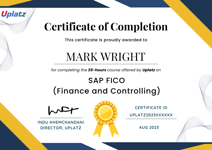
Chief Information Officer (CIO) Premium Career Track
Program consisting of courses to help you fulfil your dream of becoming a C-Level Executive (CIO) in a top organization
Uplatz
Summary
- Uplatz Certificate of Completion - Free
Add to basket or enquire
Overview
Uplatz provides this intense Premium Career Track program on Chief Information Officer (CIO). It is a program covering all topics related to Information Services and Security, as self-paced video lectures. The program will help you pursue a career towards becoming a CIO. You will be awarded Course Completion Certificate at the end of the course.
This Premium Career Track - Chief Information Officer (CIO) program by Uplatz includes the following courses:
- CISSP (Cybersecurity)
- Cloud Computing Basics
- Business Intelligence and Data Analytics
- Tableau
- Power BI
- Data Science with Python
- Machine Learning
- Deep Learning Foundation
- Generative AI Specialization
- SQL Programming with Microsoft SQL Server
- Project Management Fundamentals
- Microsoft Project
A Chief Information Officer (CIO) is the company executive responsible for the management, implementation, and usability of information and computer technologies. Because technology is increasing and reshaping industries globally, the role of the CIO has increased in popularity and importance.
Many businesses see those initiatives - often centered around improved customer experience - as vital to their very survival. The CIO investigates how the organization can use its technological prowess, speed, and customer service to outperform rivals. This typically involves both building digital platform and adjusting the organization's operating model.
The role of the CIO is to help to set and lead the technology strategy for an organisation, in concert with the other C-level executives. As such one of the many roles of the CIO it to provide an executive-level interface between the technology department and the rest of the business.
In some, the CIO is responsible for setting the broad strategy and managing the relationship with the wider business, explaining how technology can help to streamline the supply chain or optimise business processes, while the CTO looks for innovative or emerging technologies that could potentially assist the organisation to reach its objectives. In some tech businesses the CIOs lead internal business implementations of technology, while CTOs lead the development of technologies that are being developed to be sold externally.
Course media
Description
As a Chief Information Officer (CIO), you are responsible for leading the information technology (IT) strategy of an organization. To excel in this role, you should possess a diverse set of skills that combine technical knowledge with business acumen. Here are some essential skills for a CIO:
1. Strategic Thinking: CIOs must have a strategic mindset to align IT initiatives with the organization's overall goals and objectives. This involves understanding the business landscape, identifying opportunities, and devising IT strategies that drive innovation and competitive advantage.
2. Leadership and Management: CIOs need strong leadership and management skills to effectively guide and motivate their IT teams. This includes setting clear goals, providing guidance, fostering collaboration, and ensuring the team's performance meets the organization's expectations.
3. Business Acumen: Understanding the business side of the organization is crucial for a CIO. You should have a deep knowledge of the industry, customers, and market trends to make informed decisions that support business growth. This includes financial management, budgeting, and risk assessment.
4. Technology Expertise: CIOs should have a solid foundation in technology, staying updated with the latest trends and emerging technologies relevant to their industry. While you may not need to be an expert in every area, having a good understanding of key technologies and their potential impact on the business is important.
5. Communication and Influence: Effective communication skills are essential for a CIO to interact with stakeholders at all levels. You need to articulate complex technical concepts in a clear and concise manner, build relationships, and influence decision-making processes.
6. Change Management: As a CIO, you will often drive significant technological and organizational changes. The ability to manage change, overcome resistance, and create a culture that embraces innovation is crucial to successful IT implementations.
7. Cybersecurity Awareness: In today's digital landscape, cybersecurity is a top concern for organizations. CIOs need to stay informed about cybersecurity threats, best practices, and compliance regulations to ensure the organization's data and systems are secure.
8. Vendor and Contract Management: CIOs often engage with external vendors and manage contracts for IT services or software. Understanding vendor management, negotiating contracts, and ensuring service-level agreements are met is an important skill.
9. Analytical and Problem-Solving Skills: CIOs must be able to analyze complex problems, identify viable solutions, and make data-driven decisions. Strong analytical skills enable you to assess risks, evaluate options, and determine the best course of action.
10. Continuous Learning: Technology is constantly evolving, and CIOs need to embrace lifelong learning. Keeping up with industry trends, attending conferences, pursuing certifications, and staying curious about emerging technologies will help you adapt to the changing IT landscape.
Remember that the specific skill set required for a CIO can vary depending on the industry, organization size, and its technological needs. Adaptability, resilience, and a passion for innovation are also valuable traits for a successful CIO.
Who is this course for?
Everyone
Requirements
Passion and determination to make it to the top of the corporate ladder!
Career path
- Chief Information Officer (CIO)
- Chief Strategy Officer (CSO)
- Chief Technology Officer (CTO)
- Chief Operating Officer (COO)
- Chief Executive Officer (CTO)
- Chief Data Officer (CDO)
- IT Security Specialist/Manager
- Program Manager
- Digital Transformation Manager
Questions and answers
can i get a call? want more information
Answer:Hi John Happy to help whatever way we can. Team Uplatz
This was helpful.do you have a UK number i can call to discuss this in more detail?
Answer:Hi John Happy to help whatever way we can. Team Uplatz
This was helpful.
Certificates
Uplatz Certificate of Completion
Digital certificate - Included
Course Completion Certificate by Uplatz
Reviews
Legal information
This course is advertised on reed.co.uk by the Course Provider, whose terms and conditions apply. Purchases are made directly from the Course Provider, and as such, content and materials are supplied by the Course Provider directly. Reed is acting as agent and not reseller in relation to this course. Reed's only responsibility is to facilitate your payment for the course. It is your responsibility to review and agree to the Course Provider's terms and conditions and satisfy yourself as to the suitability of the course you intend to purchase. Reed will not have any responsibility for the content of the course and/or associated materials.



